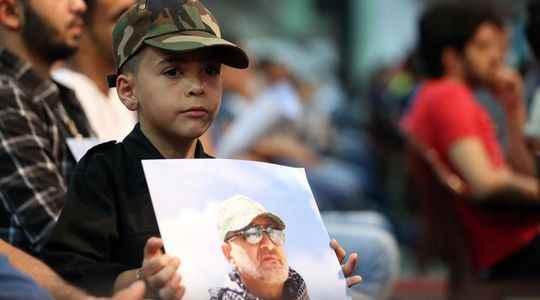“One day I came home from school crying, telling my parents that I wanted to die in shahidin ‘martyr for Islam’.” Amir* was in kindergarten. It was November 11, the day of the commemoration of the martyrs of Hezbollah. For twelve years, the young student in computer science, 18 years old today, has attended one of the al-Mustafa schools in southern Lebanon.
In this network of establishments created in 1984 by the n°2 of the “party of God”, Naïm Qassem, children from well-to-do backgrounds and for the overwhelming majority, Shiites, follow the official Lebanese program. “Over there, the most important thing is everything you are taught around, explains Amir. Especially the resistance against Israel. As if we were in a military school.”
The fight against Israel taught to the youngest
In recent months, in Lebanon, short videos showing young students educated in private schools run by Hezbollah have been looping on social networks. Children are shown waving small Iranian flags or displaying the portrait of Supreme Leader Ayatollah Ali Khamenei. Young girl scouts from the al-Mahdi network (affiliated to the schools of the same name and run by Hezbollah) even sing a song to the glory of a drone called Hassane, “flying over Palestine” and giving thread to retaliate “to the Zionist who seeks to stop this game of hide and seek”, a few days after a reconnaissance mission of Hezbollah in Israeli territory, on February 18.
“Once, at school, they put an Israeli flag in the yard for us to walk on. Another time, they burned it in front of us, it was commonplace,” said Amir, who when he was 16, said nothing, but felt deep down that something was wrong with his upbringing. “In such schools, students accept the concept of ‘martyrdom’ from an early age, which is very unhealthy, laments essayist Mona Fayad. Even the games they are taught are military games.”
On the cork bulletin boards at Amir’s school, photos of Hezbollah leader Hassan Nasrallah and fighters sit alongside those of nursery rhymes or children’s drawings. One of his teachers even died in combat in Syria (Hezbollah intervened in 2012 alongside the forces of Bashar el-Assad) and was erected as a hero. But the young boy turns out to be less permeable than his comrades. “I agreed that Israel is our enemy, but I didn’t understand why we had to help the Syrian regime,” he said.
His parents, communists, non-practitioners, had curiously wanted his brother and him to bathe in a religious universe and did not hear Amir’s reluctance to continue his education in this school. “As my mother did not wear a veil, we gave her an Iranian-style chador to enter the premises of the establishment”, says the student. By dint of arguing with his teachers, Amir ended up convincing his parents to enroll him elsewhere.
A way for Hezbollah to homogenize the Shiite community
The Mahdi schools, whose first establishment was inaugurated in 1993, are managed by the Islamic Institution for Education and Teaching, which groups together 15 establishments and are essentially reserved for party supporters and sympathizers from the “very religious and radical”, says Ali el-Amine, analyst and editor-in-chief of the Janoubia news site. “Schools are one of Hezbollah’s main institutions, which allow it to homogenize the Shiite community by operating brainwashing from childhood,” explains Mona Fayad.
At the end of the classes of one of them in Hadath, in the suburbs of Beirut, young adolescent girls covered from head to toe await their parents. A group of young people discuss politics. “Before being here, I was in a Christian school, and there was indeed the photo of the ‘baba’ [NDLR : le pape François] displayed large. I don’t understand why the fact that we display Khamenei’s or Nasrallah’s can be shocking,” replies instinctively Ahmad*, 14. “They educate these children in blind loyalty, in never questioning orders and in to comply, denounces Ali el-Amine. This vision can only survive within dictatorships.”
Impossible to visit any of the schools. The aforementioned establishments as well as Hezbollah’s communication services refused all our requests for reports. Raising this subject puts many interlocutors on the defensive. “But why do you want to talk about this? You’re not going to tell the truth, like good Westerners [NDLR : considérant que toute personne critique vis-à-vis du parti est manipulée par l’Occident] that you are”, gets carried away Mohammad*, a customer in a mobile phone store in Dahieh, whose brother-in-law has registered his children in one of the Mahdi.
Hicham*, a teacher in his thirties, says he recently accepted, for lack of anything better, a post in a religious school in the South which presents itself as apolitical. This young man, who participated in the revolution of October 17, 2019 and is openly hostile to Shiite training, did not expect to find in this establishment the same indoctrination as in institutions labeled Hezbollah. “My students love Iran. They like to talk about the war in Yemen or Iranian superiority against the American enemy, it galvanizes them,” says Hicham. Due to the serious Lebanese economic crisis, the professor cannot afford to quit his job. “It would also amount to abandoning this indoctrinated generation, to whom I hope to bring another perspective”, loose Hicham, confident, despite everything.
*The first names have been changed.
